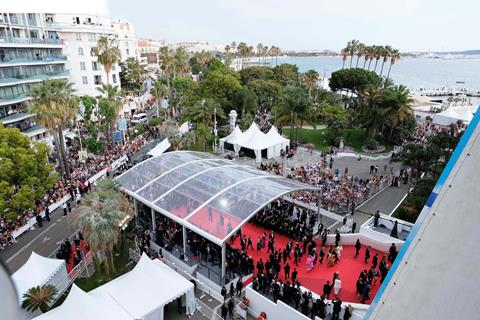
This year’s Cannes Film Festival seems to have marked something of a turning point for the beleaguered European film industry.
Going into Cannes, the European industry felt distinctly on the back foot. Trump’s plan to impose tariffs on “foreign” movies was just one part of what felt like a wider assault on the Europe’s cultural ecosystem. For some time now, Europeans execs have worried about cuts to film funding, the dismantling of cultural regulations and the unstoppable rise of the US streamers.
Back in February, Trump had targeted the EU’s Audiovisual Media Services Directive (AVMSD) which allows member states to impose financial obligations on streamers to fund local content. In this, he was supported by the Motion Picture Association (MPA), the Directors Guild of America (DGA) and the International Alliance of Theatrical Stage Employees (IATSE). Netflix, supported by Disney, was also in the midst of legal action against financial obligations in the Wallonia-Bruxelles region.
Making matters worse, the European industry also felt distinctly under appreciated by its own politicians. Ahead of Cannes, many told Screen that they were worried about the attitude of the European Commission towards the industry. In particular, they were concerned that Creative Europe – whose MEDIA strand supports the circulation of European films – may no longer be a standalone programme in the EU’s next budget.
Spurred into action
However, President Trump’s pre-festival tariff threat seemed to spur European politicians, policy makers and producers into action.
It led to a succession of interventions at Cannes underlining the need to support public film funding and regulations that foster independent production, local stories and a diverse industry.
As a result, the feeling coming out of Cannes is more positive. The festival contributed to this by showcasing the range and diversity of European storytelling. Notably, there were 18 European co-productions backed by the Council of Europe’s Eurimages Fund in the festival’s most prominent sections, including six in Competition (Sentimental Value, Romeria, Eagles Of The Republic, Sirat, The Little Sister and Young Mothers).
During the festival, the Culture Ministers of 22 European countries published a powerful joint letter in newspapers such as Le Figaro and Le Soir calling for Europe to “open our eyes to the richness of our own cinema – and to defend it.” The letter celebrated the diversity of European cinema, “with a multitude of actors dreaming in different languages and cultures” as a “driving force behind our union.”
The Culture Ministers called for greater support to the distribution of European films throughout Europe, and spoke up in favour of European co-productions. “These two urgent issues - creating better together and sharing our cinema more effectively - will be a priority for us on the European agenda in the months ahead. We affirm them today as absolutely strategic actions for our European and cultural sovereignty. We affirm them in the same way as we affirm what brings us together and who we are as Europeans,” concluded the letter.
On the Croisette
Meanwhile, a slew of senior European politicians were on the Croisette to show their support for the industry, among them French culture minister Rachida Dati and the European Commissioner for Culture Glenn Micallef. MEPs Emma Rafowicz and Laurence Farreng from the European Parliament’s culture committee were also in town. So too was UK creative industries minister Chris Bryant.
In the wake of Trump’s tariff threat, Rafowicz called on the European Commission to “take a stand against American cultural nationalism”, calling for it to protect the European cultural exception, reinforce the AVMSD and to double the budget for the Creative Europe programme. (Few execs think the latter will happen; maintaining its €2.44bn budget is seen as a win by many).
“What is happening with Trump is a chance for us,” said Farreng, referring to an opportunity to garner support for cultural funding within the European ecosystem.
On the Croisette, Rafowicz attended the launch of a co-ordinated statement signed by over 100 film and TV organisations titled “Our Stories, Our Voices: Declaration for Artistic Freedom, Cultural Diversity and Cultural Sovereignty.” Among the more than 100 signatories were CEPI (European Audiovisual Production Association), the European Film Academy, European Producers Club, Eurocinema and the Locarno Film Festival.
This followed another joint statement, published on the eve of the festival, which saw leading European audiovisual organisations call for the strengthening of the Creative Europe Media programme.
Among other politicians in Cannes was Alain Berset, secretary general of the Council of Europe, and the former President of the Swiss Confederation. He took over at the Council of Europe – which runs the Eurimages Fund - in October 2024, and has quickly emerged as strong advocate for the European industry.
Speaking to Screen at Cannes, Berset emphasised the important role of culture in functioning democracies, which he said had been ‘underestimated” by politicians in recent years. He acknowledged that Europe is preparing to spend billions more on defence, but said it was important this spending “is built on very solid ground, on democratic security.”
Diverse voices
Certainly, the very idea of a democratic, diverse Europe that fosters multiple voices and viewpoints – compared to rival powers such as Russia, China and, increasingly, the US – seemed to be an attractive and precious one to filmmakers in Cannes.
Director Tarik Saleh, talking to Screen ahead of the Cannes Competition premiere of his Sweden-France-Germany-Denmark co-production Eagles Of The Republic, spoke of the idea of Europe as refuge for filmmakers, just as Hollywood once welcomed emigre directors such as Billy Wilder, Fritz Lang and Milos Forman. He believes that more American filmmakers and stars will start to come to Europe to make their films.
“I think there is a sense of freedom [in Europe]. You’re looking for where can you tell your story without censorship, and how can express yourself freely,” said Saleh.

























No comments yet